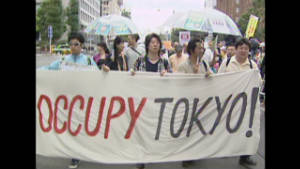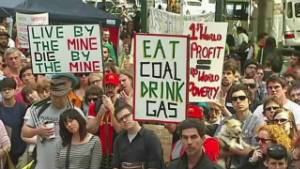The history of the Multiply group. Threads and comments that were posted "for everyone".
Sonntag, 30. Oktober 2011
Intel Spending: Pentagon Sees Cuts, CIA Sees Increases -- News from Antiwar.com
Military reliance on CIA to increase, writes Jason Ditz.
See the video 'Top Secret America' I posted on these links in last day or two, also. Is most relevant...
Even if you're 'pro' US war machine... is reliance on the shadowy, unregulated CIA for military intelligence, a good thing?
I believe some things cannot be outsourced to private interests - it fills me with dread to think of an organisation as susceptible to corruption and illegal operations as the CIA, running something as important as intelligence for the world's greatest military... with all the effects that will have on that nation's taxpayers, and on the people's lives they turn upside down in pursuit of their phantom 'terrorists'...
Private education, anyone? Healthcare?
Do you think the CIA will be open and communicate properly? Share what they know? Am I right or wrong to think of them as independent of the US government, a law unto themselves?
Have set viewing on this to 'everyone', if we don't have a level-playing field within the group... I would like to hear both sides of the argument on this?
Donnerstag, 27. Oktober 2011
Top Secret America
Other than the more overt wars in Iraq and Afghanistan, this documentary illustrates what all that money was spent on in the name of the 'War on Terror', and 'Homeland Security', back home in the 'States. Initiated by J.Cofer Black of the CIA under the Bush administration, it led to the alleged capture and assassination of Osama bin Laden, under Obama.
I caught this when it aired back in September, is quite illuminating, didn't know a lot of this... notably Michael Hayden and the NSA's role.
It asks if the world is safer now, after all that money spent. If 'the Homeland' is indeed more 'secure'...?
Personally, I think outsourcing intelligence work to corporations is as crazy as when they outsourced to foreign agencies, leading to the creation of al Qaeda in the first place... asking for trouble in years to come! They may yet have bankrupted the planet...
So, what is the evidence that the ends justify the means? Was OBL found and killed as a result of all this? Does he even matter?
See for yourself...
Dienstag, 25. Oktober 2011
Top 1 Percent: How Much Do They Earn? $343,927 or more

http://www.bankrate.com/finance/taxes/top-1-percent-earn.aspx
It's usually considered impolite to ask how much money someone makes, but that question is at the forefront of the Occupy Wall Street movement.
Protesters announce they are among the 99 percent of income earners who aren't getting the financial and tax benefits the top 1 percent receives.
So just how much do you have to earn to be part of the elite 1 percent?
That depends on whose figures you use.
Based on 2009 tax year filing data, the Internal Revenue Service says an adjusted gross income, or AGI, of $343,927 or more will put you in the top 1 percent of taxpayers.
Soldiers Burn Bill O'Reilly Books in Afghanistan (Video) - The Hollywood Reporter
I have a quandry about this. From the posting apparently they were not burned out of spite, but for "military necessity." In the remote regions of Afghanistan, recycling or sending them back was not an option due to the cost and the necessity of moving equipment and supplies considered more vital to mission requirements. However, burning a book, any book, is a crime of oppression, no matter who the author or how repugnant the message. The fact of the matter is, these soldiers need reminders of home. Chocolate bars, toiletries, clothing, novels and the like. They don't need political propaganda.
Samstag, 15. Oktober 2011
Occupy Wall Street Goes Global In Over 82 Countries
Although the 99 Percent Movement is stressing non-violence and violence has been notably absent from protesters there is a danger of violence breaking out. Let us all stress that violence solves nothing!

Occupy protests spread to cities around the world
(CNN) -- Massive crowds across the globe rallied against corporate power Saturday as the Occupy Wall Street movement spilled onto the streets in Europe, Asia and Australia.
"We're giving people a real voice against a government that just ignored us," said Peter Vaughn, a protester in London, reflecting the mood of many in the crowd. People are intent on changing financial institutions that have "gambled away our money," he added.
"We've very much been inspired in London by what's been happening on Wall Street and all across America," Vaughn said.
"If we are here, it's also to say that we can't have a dialogue with you," another protester said in Belleville, France, referring to the country's leaders.
"You are not listening to us, whatever we do, however we vote, however we demonstrate. It does not give any result. Quite the opposite, as poverty and austerity plans continue. So we can't go on like this so we are getting out and showing ourselves," he said.
United for Global Change -- the central site for the movement organizing worldwide protests -- said 951 cities in 82 countries were to take part in the demonstrations after online organizers called for a worldwide rally. Protesters marched, listened to speeches, and displayed banners reading anti-corporate slogans, including the now ubiquitous "we are the 99%."
Vandalism erupted in Rome, where witnesses saw car fires and broken windows at shops and a bank at the scene of the Rome demonstration, where many thousands turned and faced a large police presence.
Still, the demonstrations across the world were peaceful overall.
In London, WikiLeaks founder Julian Assange spoke to demonstrators.
A few hundred people gathered in Hong Kong.
"We should not let the banks get away with being big bullies," said retired businessman Wong Chi Keung.
Debbie Chen works for a group protesting against Apple's treatment of its workers in China and what she calls its "greed."
"As the world's most valuable company they earn the lion's share while the workers on the production line earn only 1% of the selling price of an iPhone. We hope there can be more even distribution of profits," she said.
In Japan, about 200 people marched through Tokyo carrying various signs, including "No More Nukes and "Free Tibet." The crowd included children jumping and skipping behind the adults. Some protesters wore costumes -- including a giant panda.
"I'm here because young Japanese people are suffering for losing their jobs, but not many speak out their issue to the public," said Kesao Murakami. "I really want to young people appeal forcefully to the public saying, 'We are in trouble.' "

Occupy protests spread to Tokyo

Occupy protests hit Melbourne

Murdoch heckled by Occupy protesters
"We are protesting mostly for economic issues worldwide," he said. "We need to come up with ideas to solve the world problems."
In the Indonesian capital of Jakarta, about two dozen people -- some wearing masks -- gathered near the U.S. Embassy.
"We wanted to show that the American regime, its system of imperialism needs to be destroyed," said Rudi Daman, leader of the International League of Peoples' Struggle.
The group urged its chapters to stage a global day of action against "imperialist plunder, repression and war."
Australian cities of Melbourne and Sydney joined rallies against "corporate greed" as protesters aligned themselves with the global movement.
"Our protests are to show our solidarity with Occupy Wall Street and also protest various problems -- from indigenous issues in this country to government problems," said Alex Gard, one of the Melbourne organizers. "We know we have it better than the protesters in the States ... but there are still problems in this country."
Organizers urged protesters to bring sleeping bags and other soft items to sleep on.
"I've heard people say they plan to be there for days, even months," Gard said.
Organizers worldwide started social media pages on Facebook and Twitter devoted to "October 15" — #O15 on Twitter — urging protesters to join the global call for protests.
The worldwide movement is galvanized by the Occupy Wall Street movement started last month as a backlash against the economy and what demonstrators say is an out-of-touch corporate, financial and political elite.
Occupy Wall Street organizers say they are inspired by the Arab Spring that led to the toppling of regimes in Tunisia and Egypt.
The founding movement in the United States has spread to other major cities in the nation.
CNN's Junko Ogura, Kathy Quiano, Per Nyberg, Laura Perez-Maestro, Livia Borghese, Erin McLaughlin, Diana Magnay and Tim Schwarz contributed to this report
http://www.cnn.com/2011/10/15/world/occupy-goes-global/index.html
Protesters in Rome burn cars, break windows
Protests inspired by the Occupy Wall Street movement have become violent in Rome as 'black block' militants smash shop windows and set fire to two cars.
4:02PM BST 15 Oct 2011
As the Occupy Wall Street protests spread around the world, in Rome police were out in force where 100,000 protesters were expected.
Two cars were set on fire and shops and banks had their windows broken during the protests in violent scenes that have been notably absent from other Occupy Wall Street protests, leading to claims that 'black block' militants have infiltrated the movement in Rome.
http://www.telegraph.co.uk/finance/financialcrisis/8829083/Protesters-in-Rome-burn-cars-break-windows.html
Mittwoch, 5. Oktober 2011
Where the Money Can Hide: The New Financial Secrecy Index was published today

Today, the second edition of the Financial Secrecy Index was published by the Tax Justice Network, covering 73 secrecy jurisdictions. The Tax Justice Network (TJN) is an international, non-aligned coalition of researchers and activists with a shared concern about the harmful impacts of tax avoidance, tax competition and tax havens.
Financial Secrecy Index
2011 Results
| RANK | Secrecy Jurisdiction | FSI - Value | Secrecy Score | Global Scale Weight |
| 1 | Switzerland | 1879.2 | 78 | 0.061 |
| 2 | Cayman Islands | 1646.7 | 77 | 0.046 |
| 3 | Luxembourg | 1621.2 | 68 | 0.131 |
| 4 | Hong Kong | 1370.7 | 73 | 0.042 |
| 5 | USA | 1160.1 | 58 | 0.208 |
| 6 | Singapore | 1118.0 | 71 | 0.031 |
| 7 | Jersey | 750.1 | 78 | 0.004 |
| 8 | Japan | 693.6 | 64 | 0.018 |
| 9 | Germany | 669.8 | 57 | 0.046 |
| 10 | Bahrain | 660.3 | 78 | 0.003 |
| 11 | British Virgin Islands | 617.9 | 81 | 0.002 |
| 12 | Bermuda | 539.9 | 85 | 0.001 |
| 13 | United Kingdom | 516.5 | 45 | 0.200 |
| 14 | Panama | 471.5 | 77 | 0.001 |
| 15 | Belgium | 467.2 | 59 | 0.012 |
| 16 | Marshall Islands | 457.0 | 90 | 0.000 |
| 17 | Austria | 453.5 | 66 | 0.004 |
| 18 | United Arab Emirates (Dubai) | 439.6 | 79 | 0.001 |
| 19 | Bahamas | 431.1 | 83 | 0.000 |
| 20 | Cyprus | 406.5 | 58 | 0.010 |
| 21 | Guernsey | 402.3 | 65 | 0.003 |
| 22 | Lebanon | 397.3 | 82 | 0.000 |
| 23 | Macao | 389.8 | 83 | 0.000 |
| 24 | Canada | 366.2 | 56 | 0.009 |
| 25 | India | 344.0 | 53 | 0.013 |
| 26 | Uruguay | 331.0 | 78 | 0.000 |
| 27 | Malaysia (Labuan) | 319.3 | 77 | 0.000 |
| 28 | Korea | 317.2 | 54 | 0.009 |
| 29 | Liberia | 316.9 | 81 | 0.000 |
| 30 | Barbados | 266.6 | 79 | 0.000 |
| 31 | Ireland | 264.2 | 44 | 0.030 |
| 32 | Mauritius | 261.6 | 74 | 0.000 |
| 33 | Philippines | 253.9 | 73 | 0.000 |
| 34 | Liechtenstein | 239.2 | 81 | 0.000 |
| 35 | Italy | 231.2 | 49 | 0.008 |
| 36 | Isle of Man | 230.4 | 65 | 0.001 |
| 37 | Israel | 230.3 | 58 | 0.002 |
| 38 | Turks & Caicos Islands | 218.9 | 90 | 0.000 |
| 39 | Netherlands | 199.7 | 49 | 0.005 |
| 40 | Belize | 198.4 | 90 | 0.000 |
| 41 | Costa Rica | 177.2 | 77 | 0.000 |
| 42 | Guatemala | 174.8 | 81 | 0.000 |
| 43 | Gibraltar | 174.6 | 78 | 0.000 |
| 44 | Ghana | 146.8 | 79 | 0.000 |
| 45 | Andorra | 133.6 | 73 | 0.000 |
| 46 | Netherlands Antilles | 129.4 | 83 | 0.000 |
| 47 | Aruba | 124.9 | 74 | 0.000 |
| 48 | Denmark | 121.7 | 40 | 0.008 |
| 49 | Botswana | 121.3 | 79 | 0.000 |
| 50 | Portugal (Madeira) | 119.4 | 51 | 0.001 |
| 51 | US Virgin Islands | 104.2 | 68 | 0.000 |
| 52 | St Vincent & Grenadines | 100.9 | 78 | 0.000 |
| 53 | Spain | 98.8 | 34 | 0.016 |
| 54 | Malta | 98.6 | 48 | 0.001 |
| 55 | Seychelles | 95.0 | 88 | 0.000 |
| 56 | Hungary | 94.8 | 47 | 0.001 |
| 57 | Latvia | 88.9 | 45 | 0.001 |
| 58 | Antigua & Barbuda | 88.5 | 82 | 0.000 |
| 59 | St Lucia | 78.7 | 89 | 0.000 |
| 60 | Maldives | 78.5 | 92 | 0.000 |
| 61 | Grenada | 57.6 | 83 | 0.000 |
| 62 | Montserrat | 50.1 | 86 | 0.000 |
| 63 | Brunei Darussalam | 45.8 | 84 | 0.000 |
| 64 | Monaco | 37.7 | 75 | 0.000 |
| 65 | Anguilla | 36.0 | 79 | 0.000 |
| 66 | St Kitts & Nevis | 31.2 | 81 | 0.000 |
| 67 | San Marino | 30.9 | 79 | 0.000 |
| 68 | Samoa | 27.5 | 85 | 0.000 |
| 69 | Vanuatu | 14.3 | 88 | 0.000 |
| 70 | Cook Islands | 13.4 | 75 | 0.000 |
| 71 | Dominica | 12.5 | 80 | 0.000 |
| NA | Nauru* | 0 | 93 | NA |
| NA | France* | 0 | NA | 0.008 |
*Temporarily withdrawn pending legal interpretation
http://www.financialsecrecyindex.com/2011results.html
"Switzerland is the grandfather of the world’s tax havens, one of the world’s biggest financial centres, and one of the world’s biggest secrecy jurisdictions or tax havens. About a third of the world’s cross-border invested private wealth is managed in Switzerland, amounting to around US$ 2 trillion, according to the Swiss Bankers’ Association. Swiss banking is historically based on two main foundations: secrecy, and political stability.
With total banking assets recently estimated at 820 percent of Swiss GDP (compared to ‘just’ 460 percent in the UK), banking looms larger in Switzerland as a share of the economy than in almost any other country. Given this dominance, with UBS and Credit Suisse accounting for about half of all Swiss banking assets, it is hardly surprising that the Swiss state is significantly ‘captured’ by the financial sector. However, although the Swiss state generally defends the interests of Swiss banks and bank secrecy, many Swiss – though probably a minority – oppose it."
from http://taxjustice.blogspot.com/2011/10/financial-secrecy-index-2011-focus-on.html
"The Cayman Islands is an Overseas Territory of the United Kingdom. It operates a considerable degree of political and economic autonomy from the UK but enjoys the UK’s constitutional oversight at the same time – a crucial reassurance for foreign investors who have flocked to Cayman. The Governor, appointed by the UK, presides over the Cayman cabinet and appoints members of the judiciary and the police commissioner. The UK has responsibility for defense, foreign affairs, internal security, the police, the civil service and ‘good governance’.
Cayman markets itself as being an upmarket financial centre, and there is no doubt that a large share of its business comes from some of the world’s biggest banks, corporations, hedge funds and other entities. It has been described as the world’s fifth biggest financial services centre. Hosting over 10,000 mutual funds, almost 300 banks and over 90,000 companies, it is by far the world’s leading domicile for hedge funds, the leading domicile for healthcare captive insurance companies, and it is second only to Luxembourg in mutual fund administration.
With financial services accounting for well over half of gross domestic product, this is, like many offshore jurisdictions, heavily reliant on the financial services industry. There are no direct taxes in Cayman; most government revenue comes from fees and duties such as import duties, work permit fees and financial industry registrations."
http://taxjustice.blogspot.com/2011/10/financial-secrecy-index-2011-focus-on_05.html
Next month will be published the BPI, (Bribe Payers Index) and the CPI (Corruption Perceptions Index) in two months by Transparency International, this will be the first time that all three dimensions of corruption are covered in one year.
Now I want to know, who's money is hidden there?